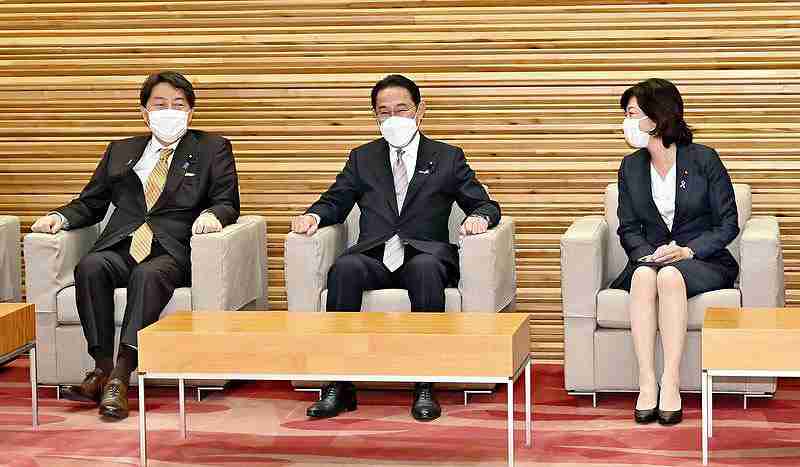
Prime Minister Fumio Kishida, center, attends an extraordinary Cabinet meeting Friday at the Prime Minister’s Office.
November 20, 2021
A new stimulus package approved by the Cabinet Friday includes many of the campaign pledges that the ruling Liberal Democratic Party and its coalition partner Komeito made in October’s House of Representatives election. The budget for the stimulus package ballooned even while many people expressed doubt about its effectiveness.
Supply-demand gap
“We are now in an emergency situation and we have carefully prepared things necessary to protect the lives and well-being of the people,” Prime Minister Fumio Kishida said during an interview with Cabinet press club reporters at the Prime Minister’s Office on Friday.
Discussions related to economic stimulus and the compilation of a supplementary budget started in early spring this year when the number of new coronavirus infections started to increase. In March, Kishida, then the chairperson of the LDP Policy Research Council, handed then Prime Minister Yoshihide Suga a proposal asking for a new economic stimulus package.
Lawmakers of ruling and opposition parties alike called for tens of trillions of yen in stimulus, based on the fact that the gap between demand and supply capacity in the Japanese economy for the January-March quarter of 2021 was estimated at more than ¥20 trillion. It was thought that a stimulus package would boost demand to fill the gap.
Start of the Cabinet
The change of prime minister and the following lower house election resulted in pumping up the stimulus even further. This is because the package is now intended to reflect commitments made by Kishida’s newly launched Cabinet while also continuing to strengthen infection prevention measures.
The daily number of new infections nationwide has decreased from about 26,000 on Aug. 20 to less than 200 at present. While it is necessary to provide support for people whom the pandemic has hit hard, it is unclear if the Cabinet carefully and closely examined the range of people eligible for the assistance.
For example, the stimulus package features benefits worth ¥100,000 for children aged 18 or younger, which was a Komeito campaign pledge. Responding to criticism that it was mere pork-barrel spending, the ruling parties set an annual household income cap for the benefit. Households in which a member has an annual income of ¥9.6 million or higher are not eligible for the handout, but this still means the money will be provided for nearly 90% of all children of that age group.
In a different ¥100,000 cash handout program implemented last year, most of the money is believed to have been saved, leading many people to question the effectiveness of such cash handouts as a stimulus measure, especially in light of their enormous scale.
As for assistance for small and medium-size businesses, the government has eased requirements related to lost sales, so as to make it easier for these businesses to receive government relief.
In the end, the fiscal spending plan amounted to ¥55.7 trillion, exceeding the ¥48.4 trillion in a stimulus package decided in April 2020 when the virus infections were on the rise, and the ¥40 trillion in another package decided in December 2020.
Stagnation
Japan’s real gross domestic product for the July-September quarter of 2021 was ¥535 trillion on an annualized basis, which was even lower than the ¥547 trillion marked in the October-December quarter of 2019, when the consumption tax rate was raised to 10%. The annualized growth rate from the previous quarter was minus 3%, the first negative growth rate seen in two quarters. Compared to countries such as the United States and China, which are growing, Japan’s delayed recovery stands out.
The financial market has focused on whether the Kishida Cabinet’s economic measures will boost and accelerate the recovery of the Japanese economy. While the size of the package surpassed market expectations, many market players are critical of the details.
Yunosuke Ikeda, chief equity strategist at Nomura Securities Co., said: “For overseas investors, it is important that they can imagine that the package will help increase Japan’s competitiveness. In that sense, the package is insufficient and lacking in freshness.”
Top Articles in Politics
-

Japan PM Takaichi’s Cabinet Resigns en Masse
-

Sanae Takaichi Elected Prime Minister of Japan; Keeps All Cabinet Appointees from Previous Term
-

Japan’s Govt to Submit Road Map for Growth Strategy in March, PM Takaichi to Announce in Upcoming Policy Speech
-

LDP Wins Historic Landslide Victory
-

LDP Wins Landslide Victory, Secures Single-party Majority; Ruling Coalition with JIP Poised to Secure Over 300 seats (UPDATE 1)
JN ACCESS RANKING
-

Japan PM Takaichi’s Cabinet Resigns en Masse
-

Japan Institute to Use Domestic Commercial Optical Lattice Clock to Set Japan Standard Time
-

Israeli Ambassador to Japan Speaks about Japan’s Role in the Reconstruction of Gaza
-

Man Infected with Measles Reportedly Dined at Restaurant in Tokyo Station
-

Videos Plagiarized, Reposted with False Subtitles Claiming ‘Ryukyu Belongs to China’; Anti-China False Information Also Posted in Japan





















